
3,373 views
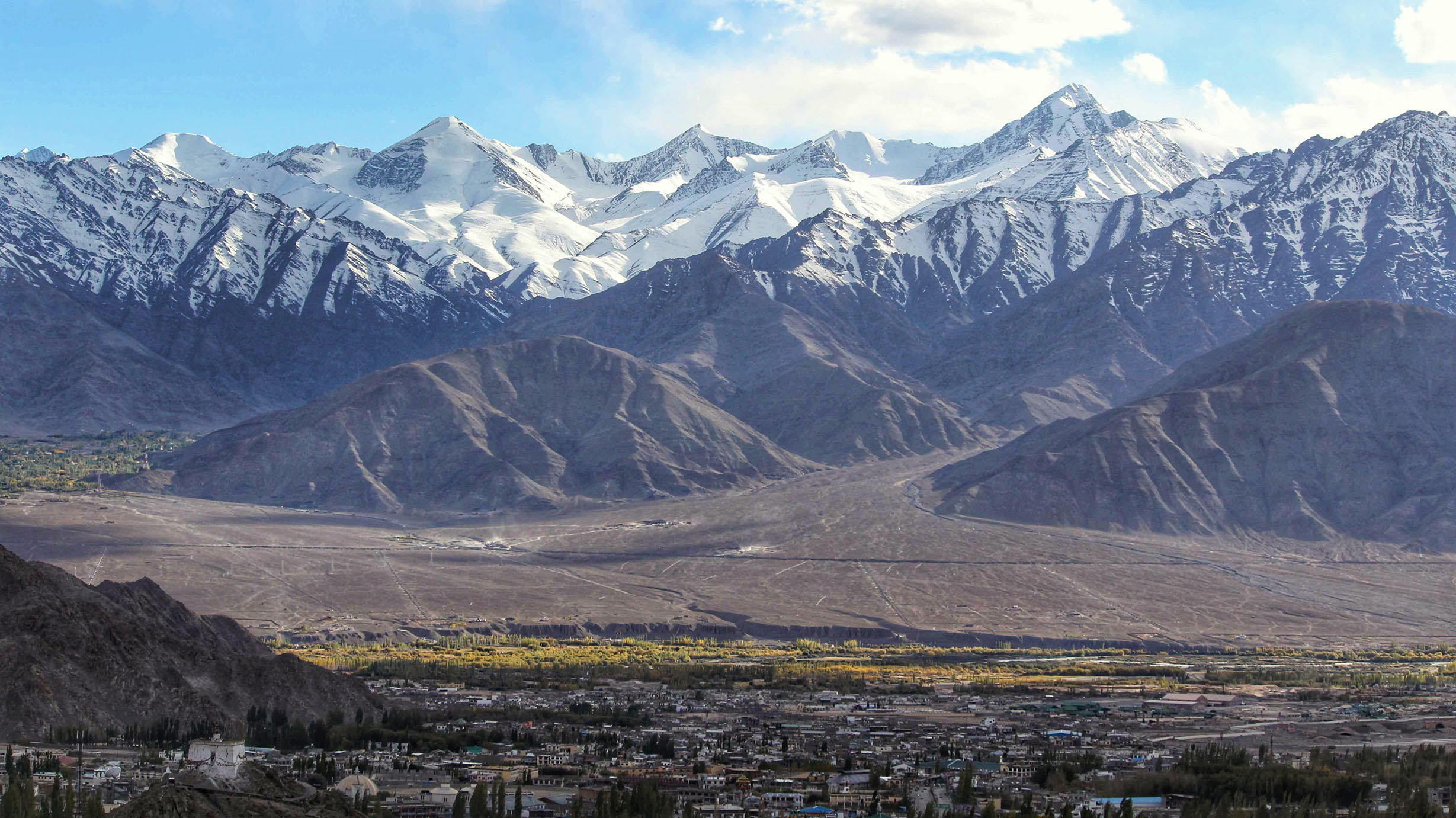
Leh: The Place from my Dreams
By Dr Ggarima Pandde
Last Updated: 14 Feb 2022
“You never change your life until you step out of your comfort zone” this quote aptly suited me as I was a tad hesitant to disembark on the Leh Ladakh trip which I did not know would turn out to be one of the best ones. The decision would be tough for anyone given the terrain is difficult and one starts questioning one's health capabilities. After much cogitation, I decided to move ahead with the Leh trip and believe me, I did not regret it.
The journey began with the obvious jitters while boarding the flight from Delhi to Leh. The passengers were filled with excitement the moment the pilot announced that we were at an altitude of nearly 11,500 feet above sea level. The view over the picturesque mountains was breathtaking. I was excited to reach the destination as soon as possible. Fellow travelers and myself were welcomed by the cool breeze and the scenic mountains which surrounded the Leh airport. We reached out to our bags to find the warmest clothing available. Leh airport is relatively small in comparison to other commercial airports, the main reason behind this is the slightly unfavorable terrain. The security here is of the highest order due to its critical location.
Perching on the rock near the Gurudwara Shri Pathar Sahib
Our stay was at a humble homestay with sufficient amenities one would need. These homestays in Leh are the perfect options for people who wish to get the feel of the local hospitality.
First day consisted of rest and leisure to acclimatize our body with the sudden change in temperature altitude and oxygen levels in Leh, Ladakh. Good amount of rest and food would prepare you well for the upcoming adventurous things to do in Ladakh. After a siesta, we headed to explore the town of Leh. The main market is best explored on foot. You could stroll around the market and get acquainted with the local craftsmanship. We choose a guided heritage walk in Leh. This delightful market consisted of beautiful handicrafts, souvenirs and woolens. You would find the famous Ladakhi flag with the mantra printed on it, in every other shop. Tiny handicrafts to prevent bad omen, bracelets, pendants, keychains are a few names worth mentioning. The people are welcoming and humble with a pleasant smile. The ambience is quite colorful which would be a sight for sore eyes. Most of the market places begin to shut for the season by the last week of September so the best time to visit Ladakh would be from April to July.
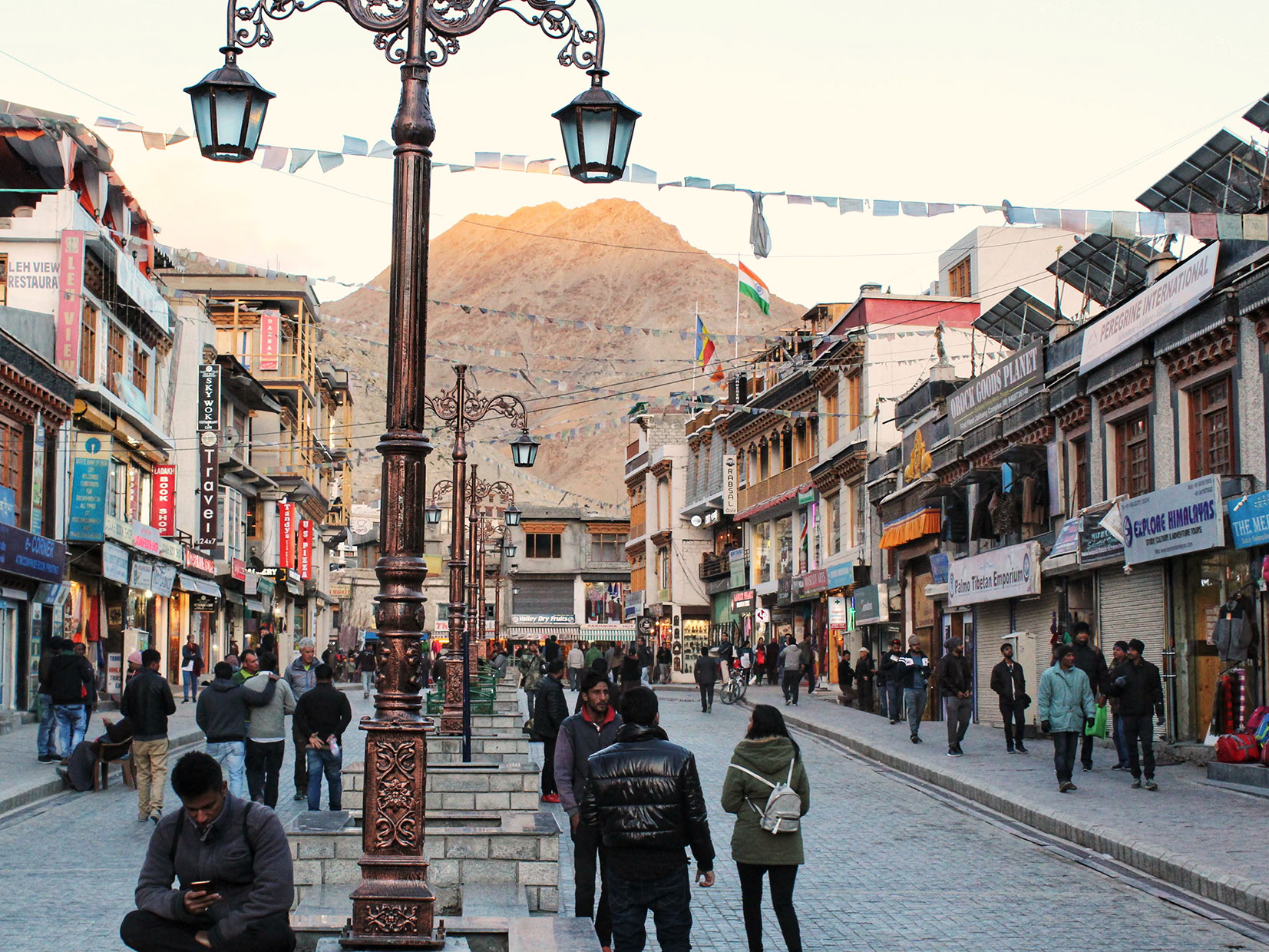
Hustle-bustle of the quaint market in the middle of the Leh town
The Hall of Fame Museum
The Hall of Fame museum built in 1986 is at a distance of 3 km from Leh town. It is run by the Indian army. It has all the weaponry, photographs and artillery that has been used by the army over the last few decades. They give you a guided tour of the place with the details of every object and pictures. You can roam around, click pictures and soak the stories in. The Hall of Fame in Leh Ladakh is built in a two storeyed fashion and is divided into various galleries. The ground floor is partly dedicated to the history of Ladakh and local traditions. It also provides a brief on the Namgyal dynasty. There is a gallery which is dedicated to the 1962 Indo-China war.
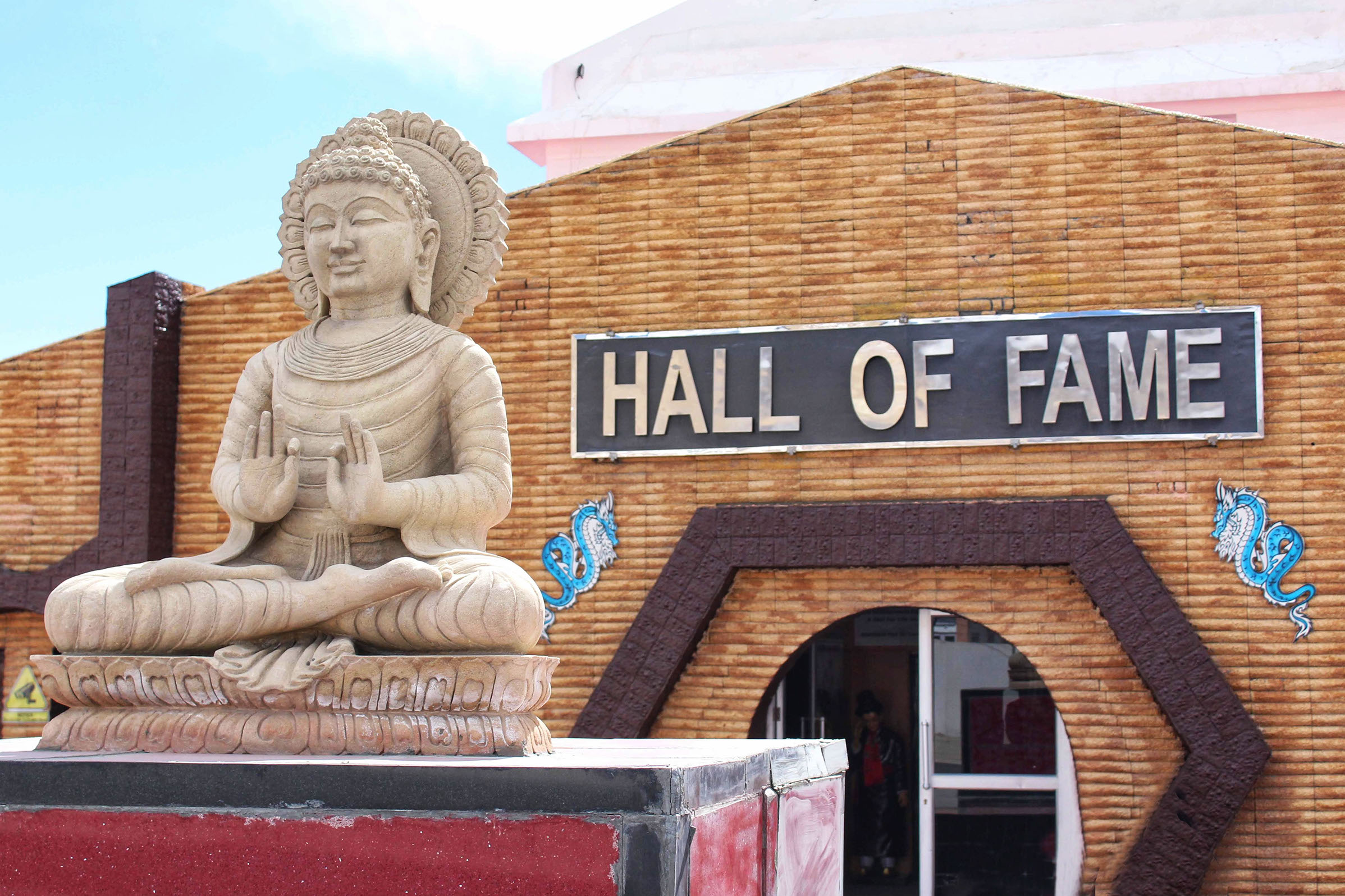
The architectural gateway of the Hall of Fame museum - an oval door with a hexagonal border
I particularly found the gallery with details of the life of a soldier in the Siachen glacier quite intriguing. Apparels, snowmobiles, tents are all displayed here which would educate us with the hardships that a soldier would go through while being on duty in this extremely tough terrain. The top floor brings the "Operation Vijay" gallery. It reminds us about the Kargil war and also Capt Vikram Batra. Surrounding the museum is the memorial spread across a large area known as Vijaya sthal. It has the names of brave soldiers carved on planks who martyred for the nation during the 1948 war.
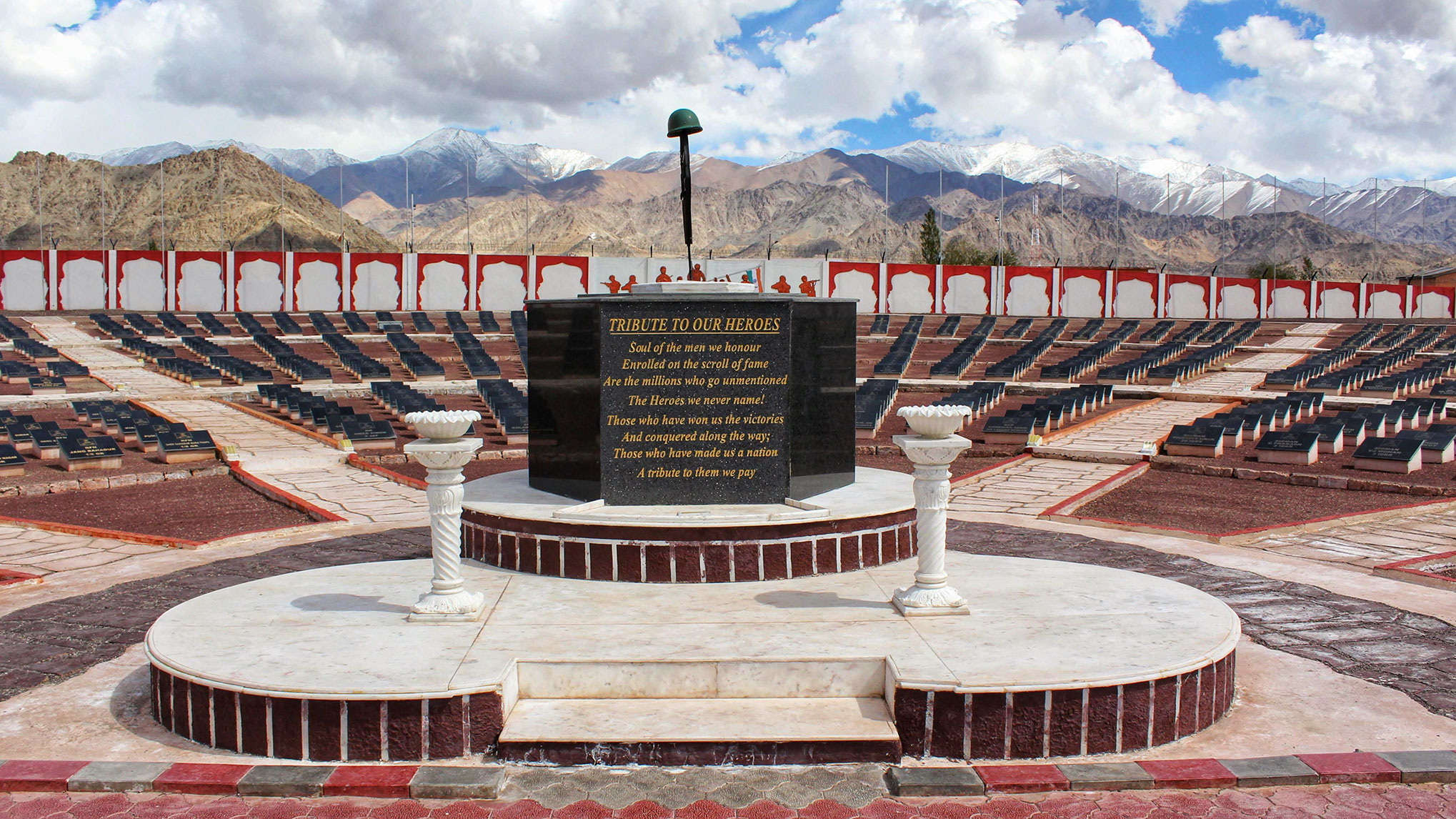
The vicinity of the museum where planks with martyr's name engraved on them
This place would fill you with pride and gratitude towards our soldiers and the nation. This place also has a souvenir shop for you to buy collectibles and mementos. Coffee house is also located outside the museum. Anywhere between 1.5 to 2 hrs are sufficient to explore this attraction.
Indus-Zanskar confluence
Indus and Zanskar are the two prime rivers of Ladakh. The place of Indus-Zanskar confluence brings an unmatched visual experience for the visitors. It is a wonderful fusion of two colors: the blue of the Zanskar River and the green of the Indus River. The Indus River originates in the Mansarovar range whereas the Zanskar River in the Zanskar valley.
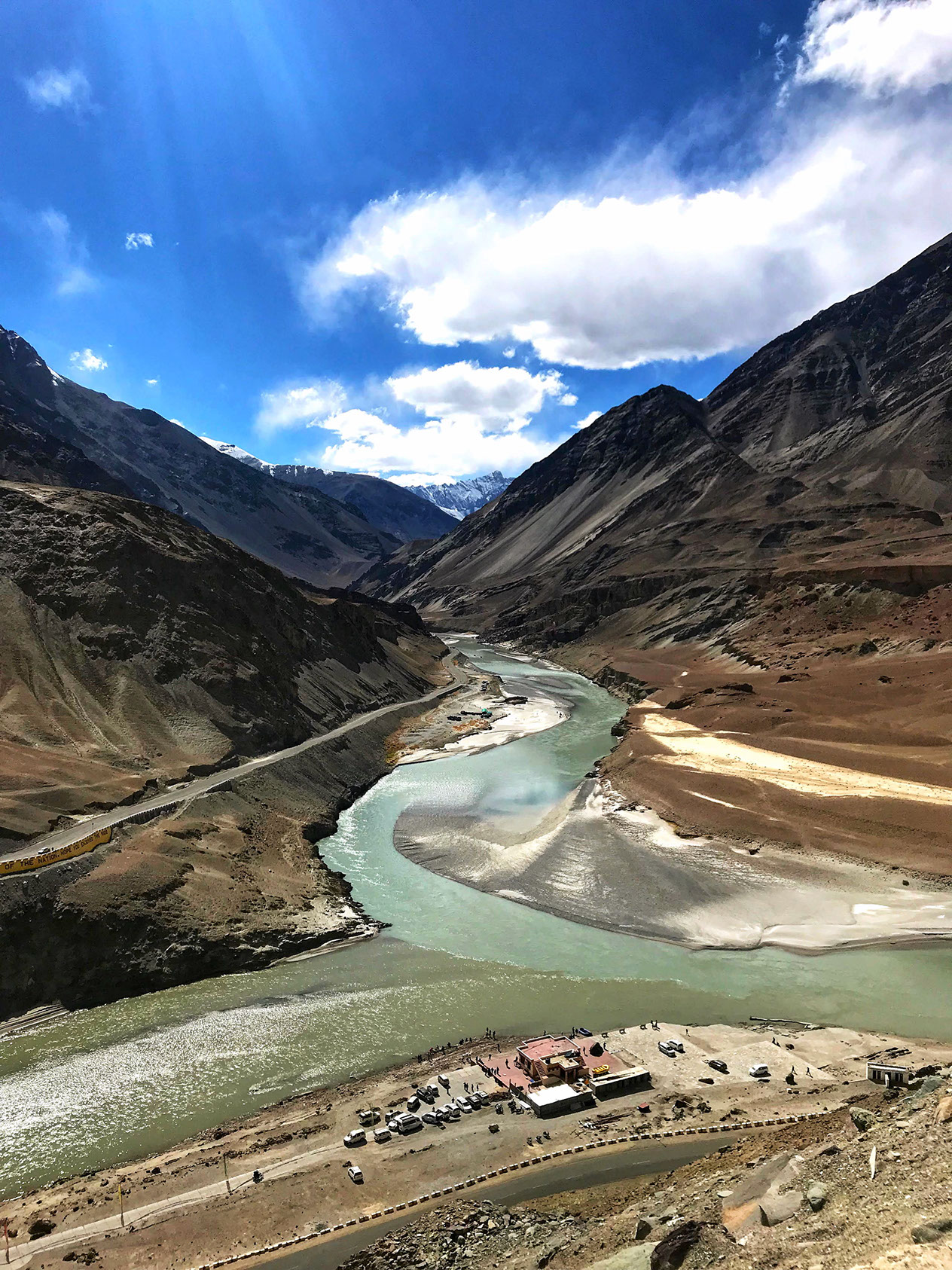
Picturesque play of colors at the confluence of Zanskar and Indus Rivers
The confluence of Indus and Zanksar is also popularly known as the Sangam point. Zanskar flows quicker than Indus but during the winter it completely freezes which paves the way to the renowned Chadar trek. Chadar as the name would suggest means bedsheet. And it is rightly named so,as the frozen snow resembles a white bed sheet. The Chadar trek is believed to be more challenging than the Hampta Pass trek. During the summer months, activities like rafting could be done here. It would be advisable to carry food as there are limited options to buy them here. The confluence could be viewed from a distance. You can also soak your feet in water if the weather permits. One can follow the path along the river, take a stroll, soak in the sun while perching over the rocks.
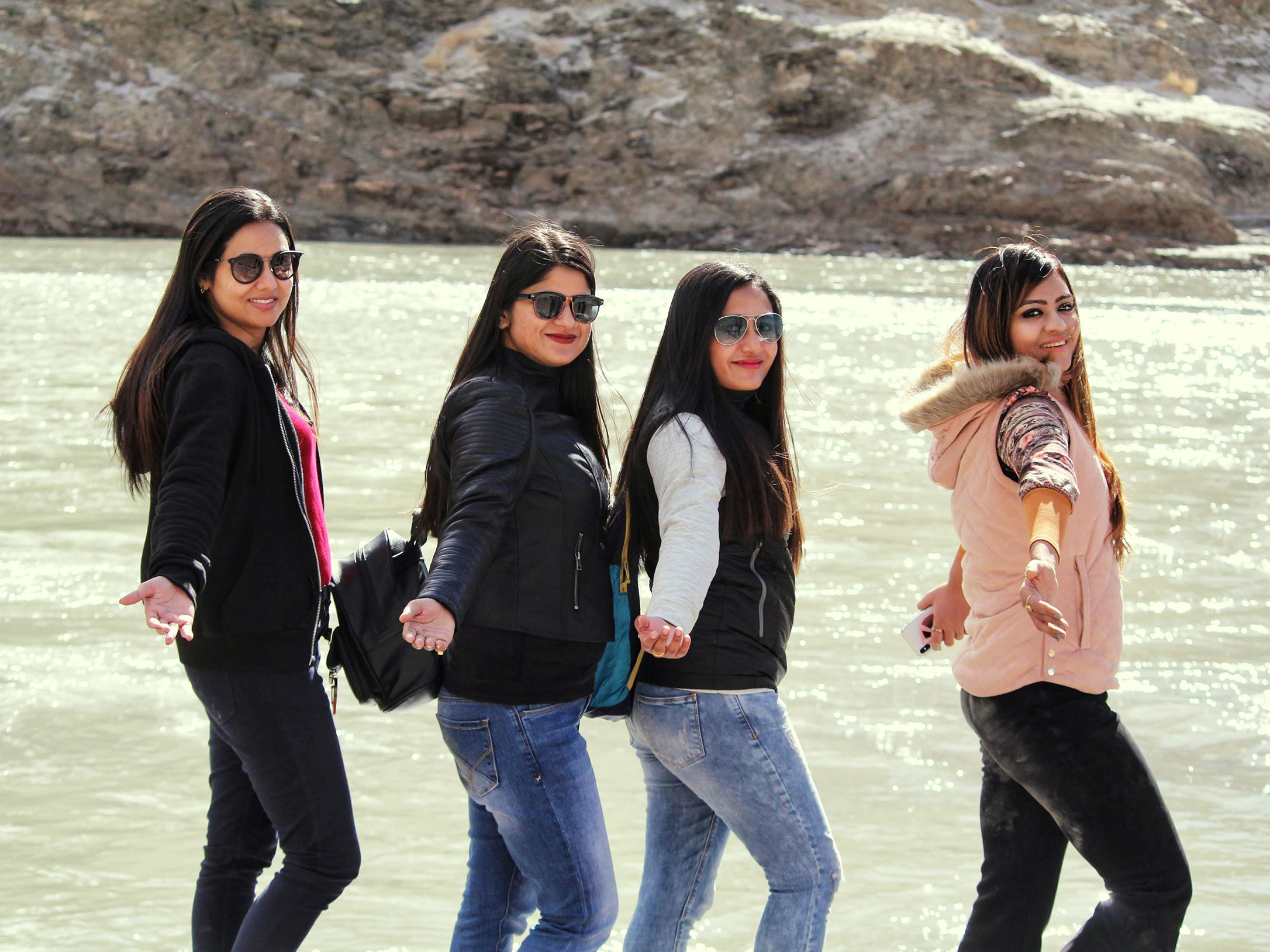
Embracing the confluence with open arms
Gurudwara Shri Pathar Sahib
Shri Pathar Sahib Gurudwara in Leh Ladakh is located at an altitude of 12,000 feet and about 23 km from Leh town. It is considered to be one of the highest Gurudwaras in the world along with Hemkund Sahib. However, getting there isn't as difficult as reaching Hemkund Sahib, which is near the Valley of Flowers. It is of great importance to the locals due to a folklore being associated with it. As per the story of Gurudwara Pathar Sahib, there was a clash between Guru Nanak dev ji and an evil identity who used to trouble locals. Upon listening to the prayers of the masses, Guruji decided to visit the place and take on the evil identity on his own. Once while Guruji was engrossed in his prayers, the monster threw a huge stone ("patthar") on him. The stone turned into wax upon touching Guru Nanakji's body and the monster was captured inside the wax. After pleading for mercy and agreeing to live peacefully, Guruji let him go. This holy stone could be witnessed inside this holy shrine.
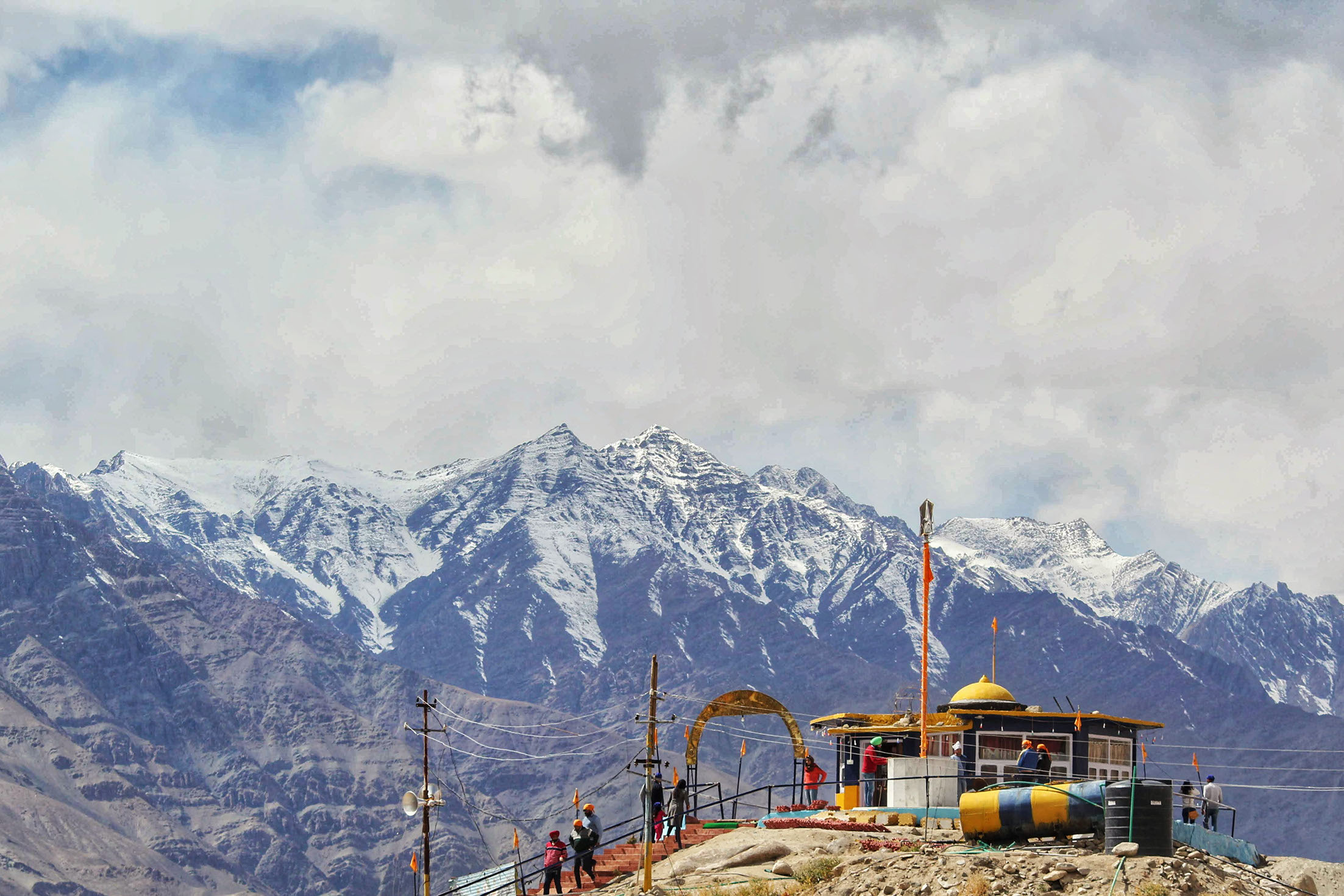
Gurudwara Shri Pathar Sahib is surrounded by the magnificent snow-covered mountains
Leh Royal Palace
From atop a hill, this historic place known as the Leh Royal Palace, built in the 17th century, gives a spectacular view from its roof. Nine-storeys high, most of the palace is dilapidated, but it houses artifacts from the royal family that lived here.
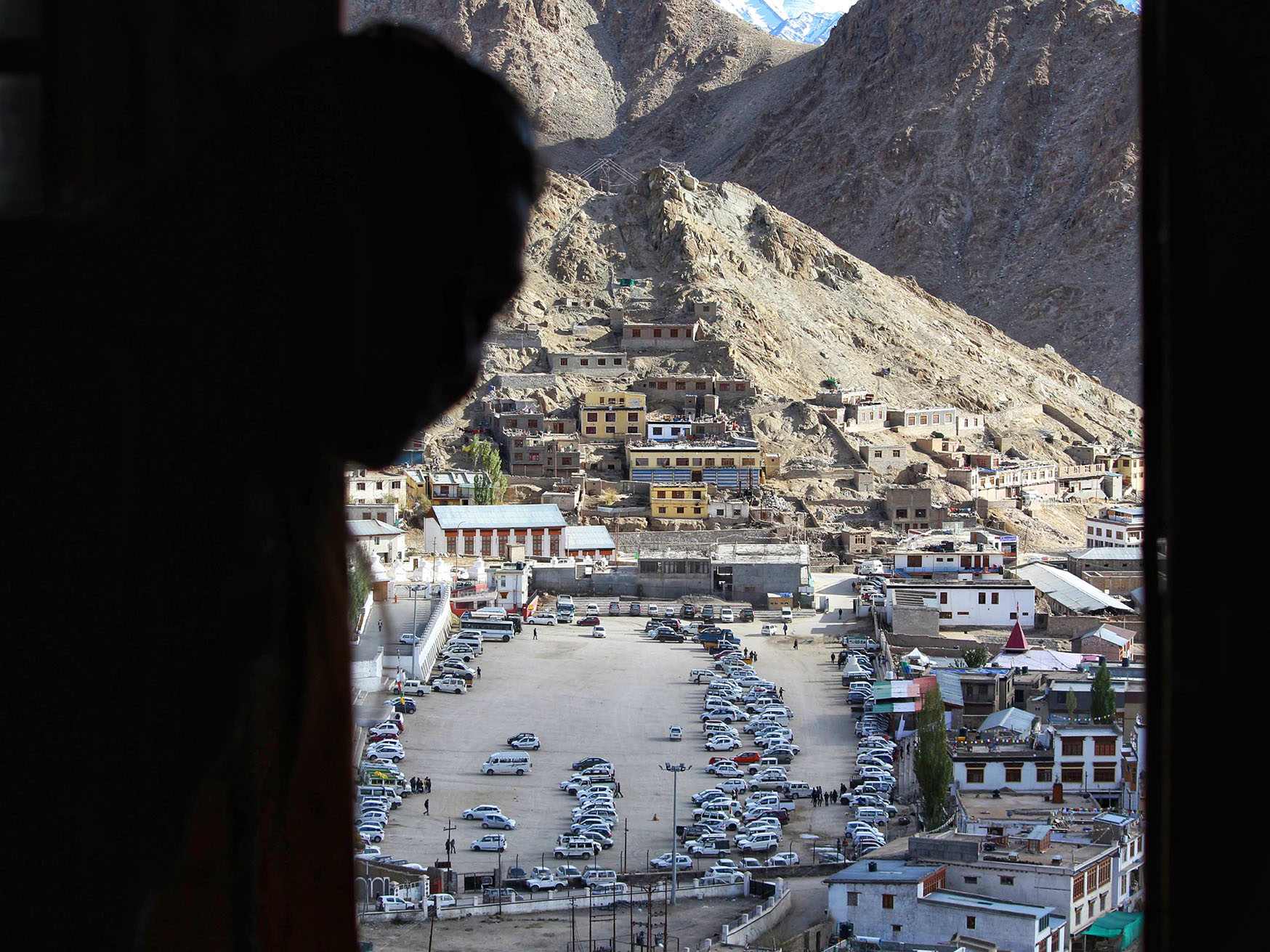
View of the opposing mountains from the inside of the Leh stok palace
Shanti Stupa of Leh
Shanti stupa in Leh is a perfect stop for someone looking for a break from the hustle and bustle of city life. This white domed Buddhist monument was built to commemorate the 2,500 years of Buddhism. At a height of around 11,000 feet, it gives you a panoramic view of Leh town.
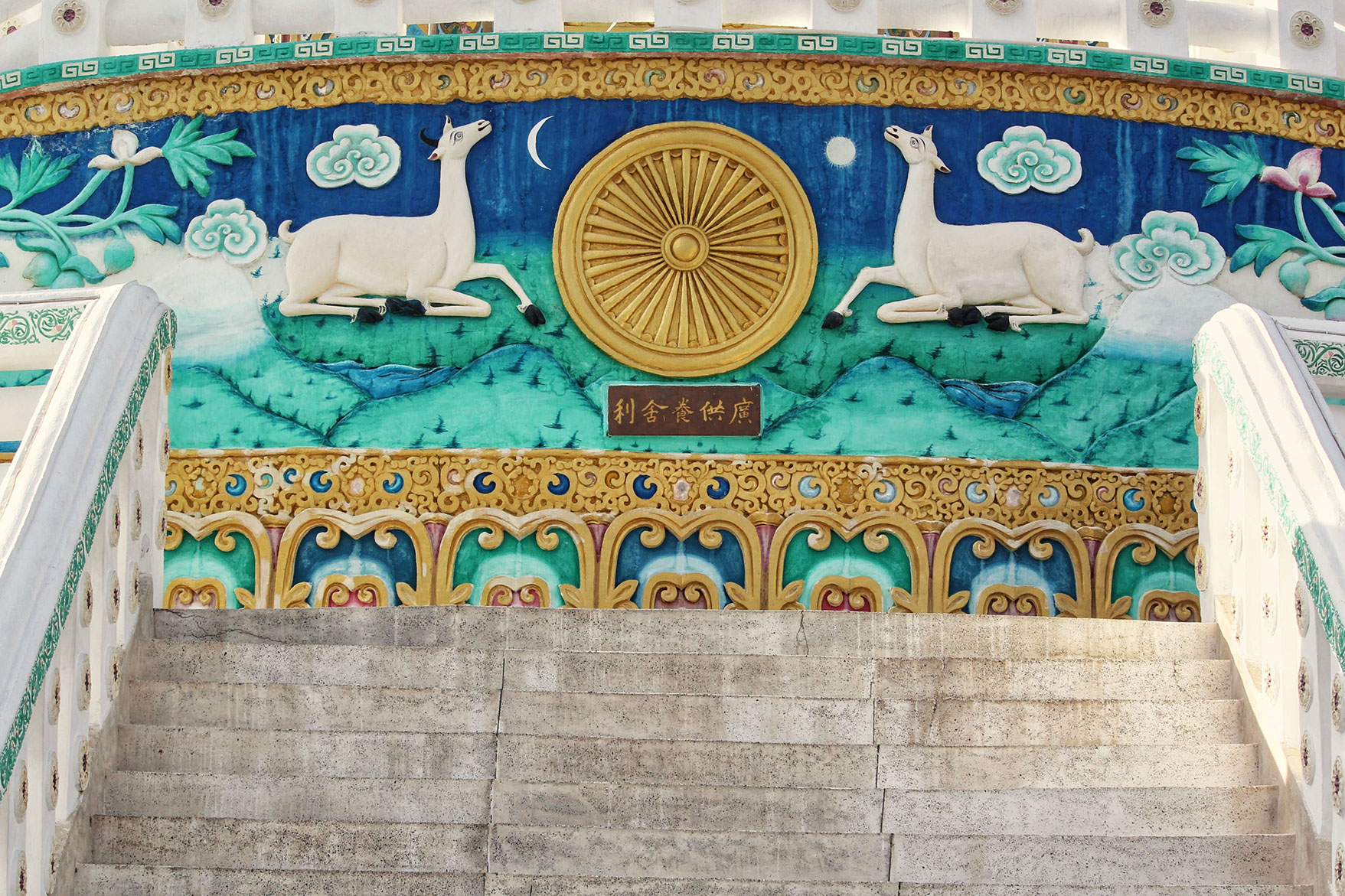
Steps leading to the dome of the Shanti stupa
Located at the top of a hill, the view from here is unique. The strong breeze fills the air with an aroma of freshness. One gets a panoramic view of the town and the surrounding mountains. It is a place of calmness and peace. It presents extreme positivity and you come to realize humility once you are reminded of Buddhist teachings while being here. You can spend some time in solitude here, contemplating in peace. It's better to explore this place during the summer months, because it gets more windy during the winter months. Walk around the dome and capture the view from every angle you can.
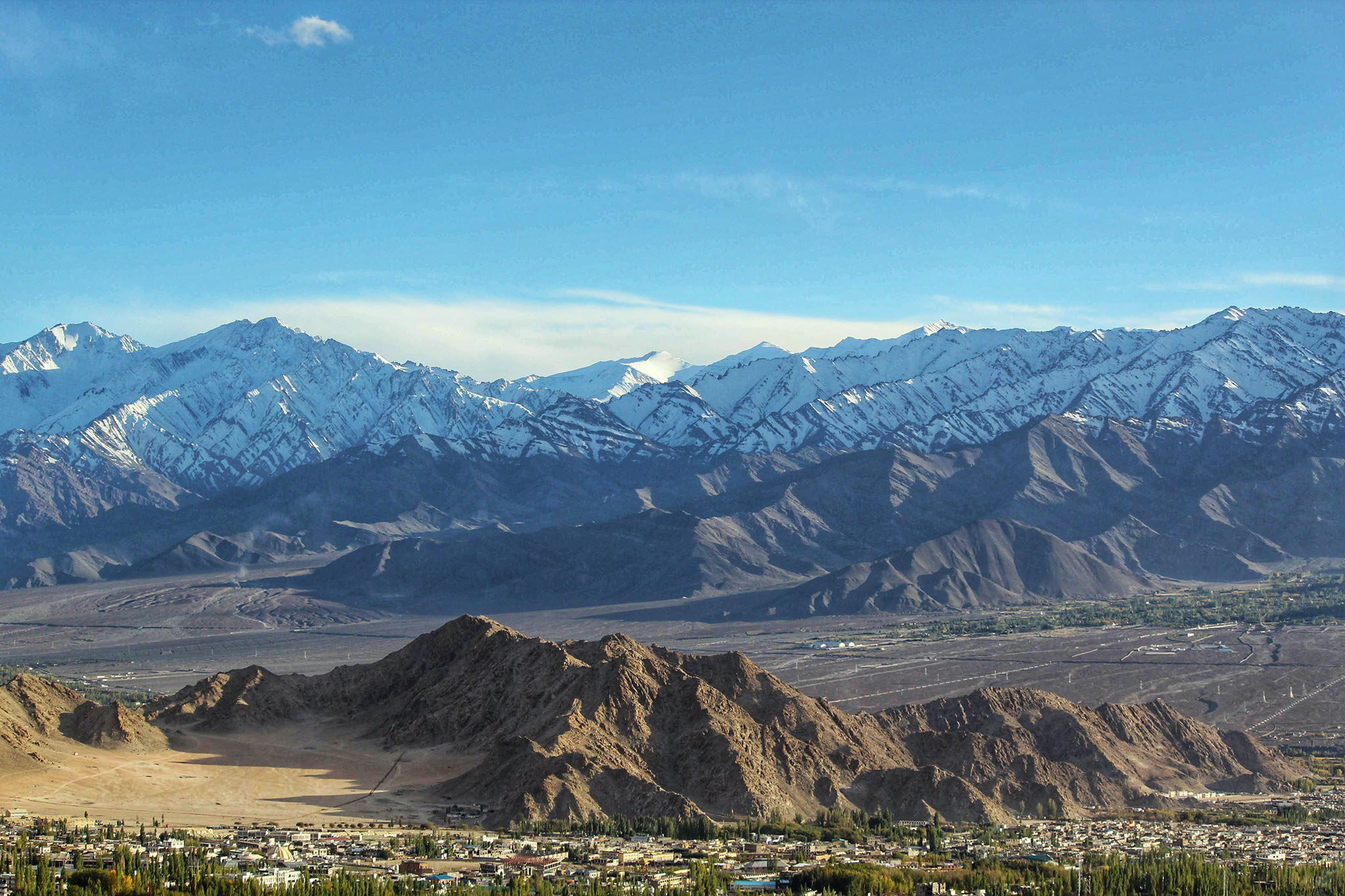
Mountains resembling the crease on white and brown silhouette
Known as the 'Kumbh mela of the Himalayas', Naropa is one of the most prominent Buddhist festivals worldwide. A festival celebrating the life of the great Buddhist philosopher and scholar - Naropa - is celebrated. There is a bridge decorated with prayer flags on the way to the Hemis monastery, where this congregation takes place. There were performances by Papon, Kailash Kher, and other Himalayan artists during the 2018 Naropa festival.
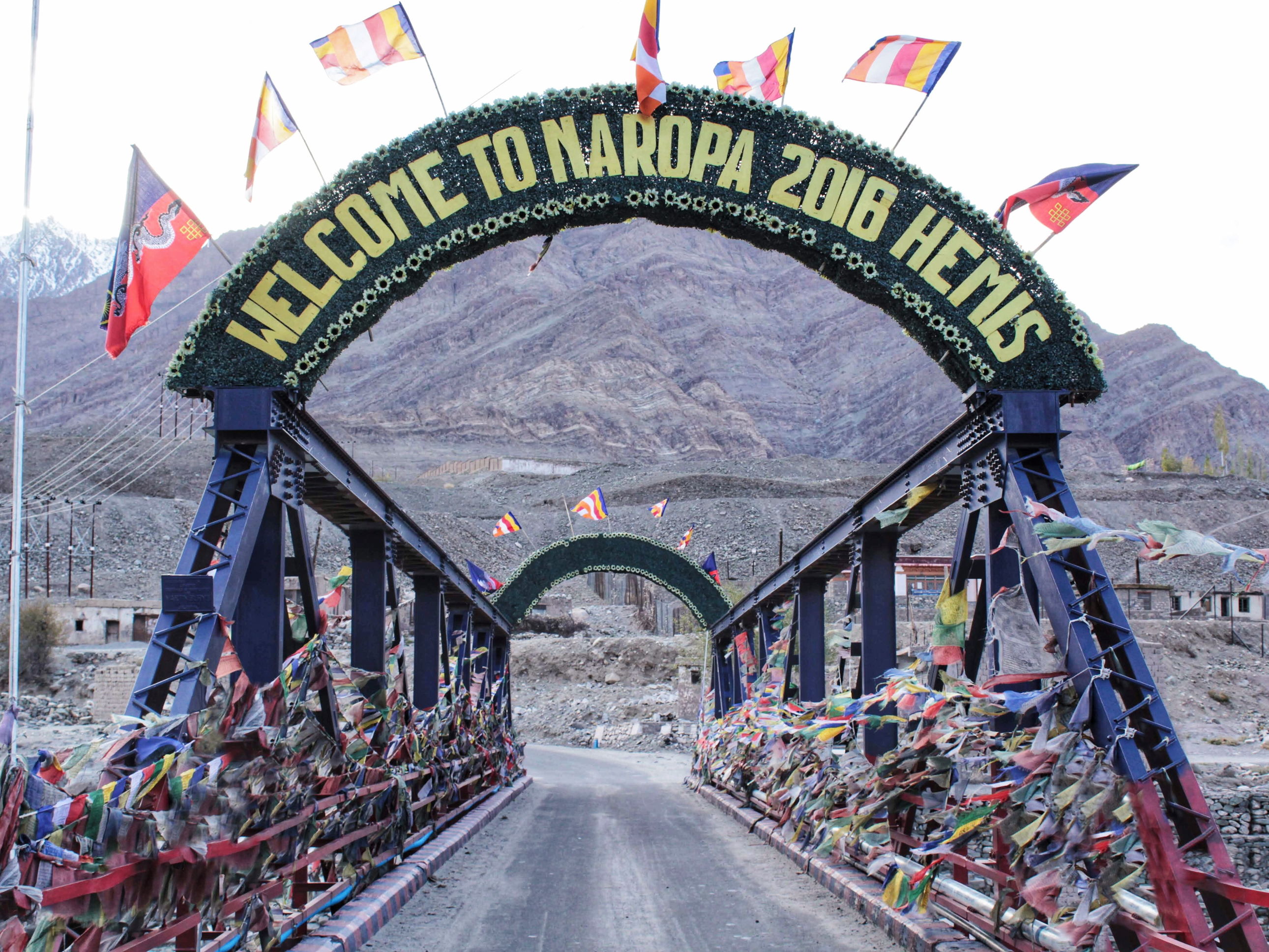
Gateway to the Hemis monastery
Hemis Monastery
Hemis monastery in Leh is one of the most popular monasteries in Ladakh region, and it's also apparently the richest. The golden and scarlet architecture of Hemis Monastery and statues here are awe-inspiring. This place is believed to have been built before the 11th century. Founded by Naropa, the Kagyu lineage of Himalayan esoteric Buddhism occupies this monastery as its main seat.
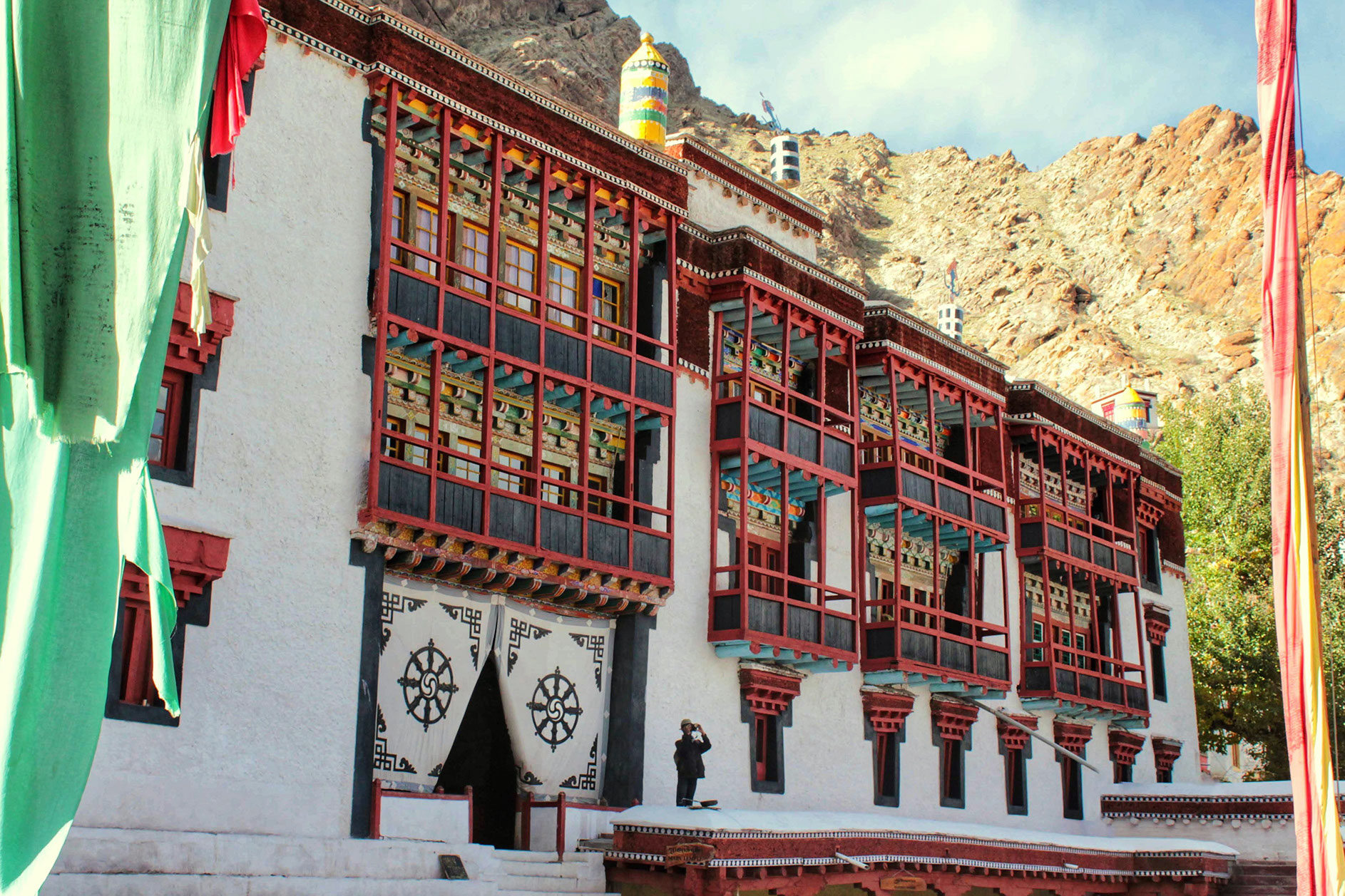
Outer view of Hemis monastery museum
In Dukhang Barpa, there is a golden statue of Shakyamuni. The monastery's architecture is inspired by the Tibetan style. The guardian deities and the Wheel of Life are beautifully displayed inside the monastery. You can pray in peace in the main prayer hall of this monastery. There is also a two-day Hemis monastery festival held annually on the 10th day of the fifth month of the Tibetan calendar.
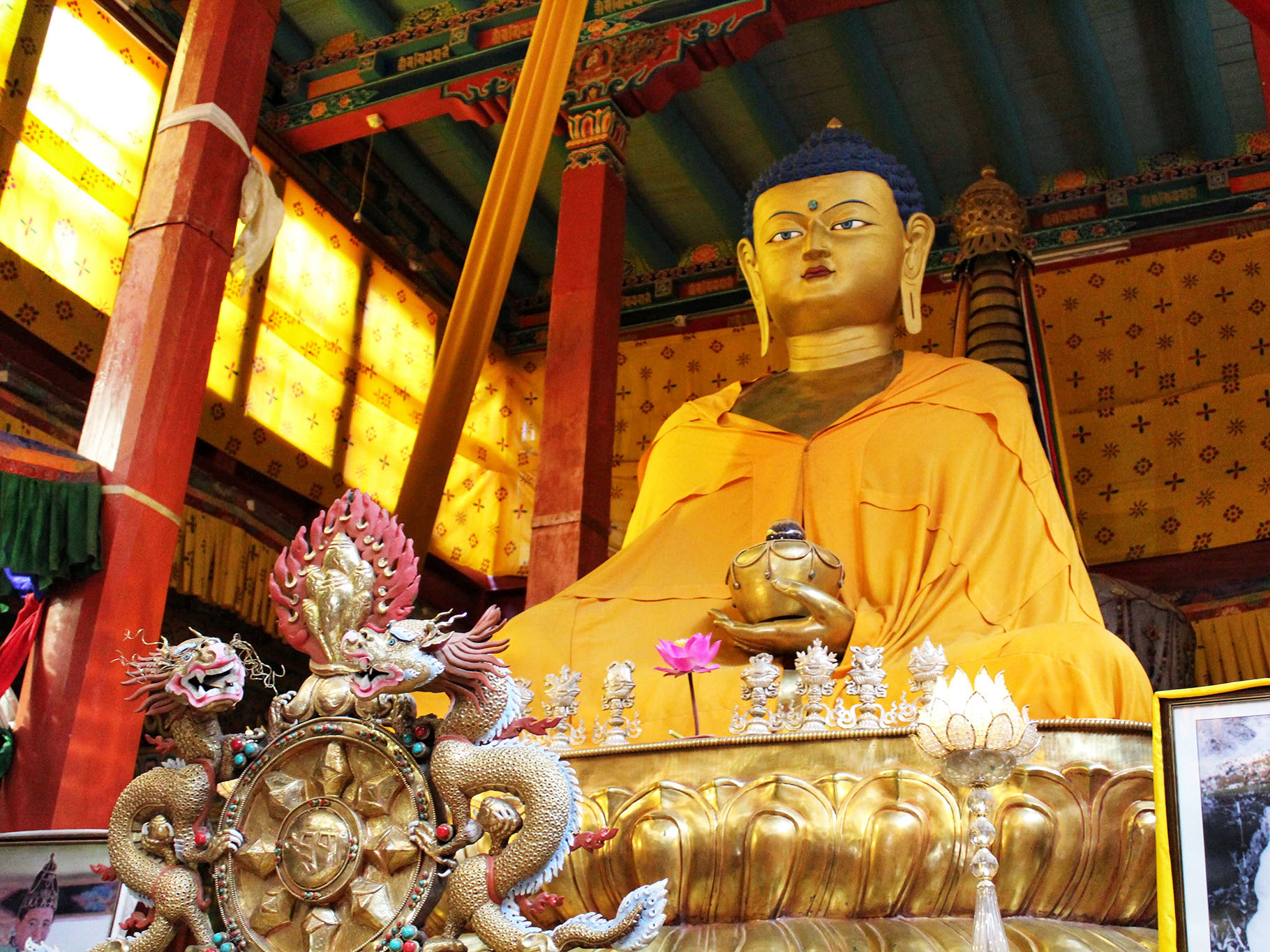
Golden Buddha statue at the Hemis monastery
Rancho Cafe /Druk Padma Karpo School
There's a good chance that this reminded you of the Bollywood movie '3 idiots'. Well, you're right, Racho Cafe in Leh is the place where some of the movie scenes were shot. Popularly known as Rancho cafe/school, it is one of the places that attract tourists to Leh. This place needs no introduction as people could easily recognize this place. The name of this place has a meaning. In the native Bodhi language, Druk means white and Padma means lotus. The character 'Phunsuk Wangdue' from the movie '3 idiots' is loosely based on the engineer Sonam Wangchuk from this region. Sonam Wangchuk is very well known for his energy-saving and conservation efforts in Ladakh area.
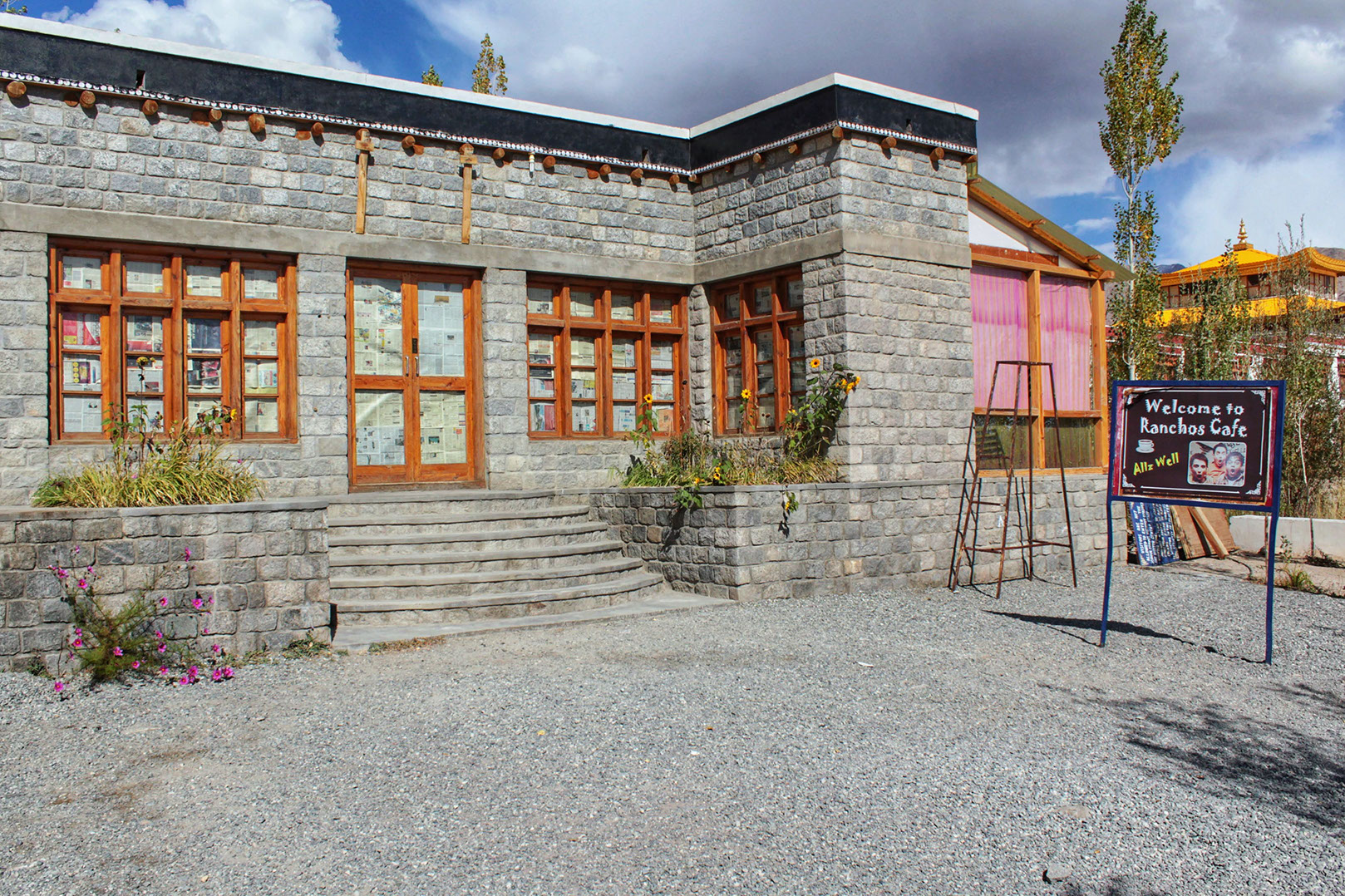
Rancho cafe in the Druk Padma school compound
Getting ready for the exciting journey ahead
So far, the journey has been very fulfilling and exciting. I'm curious and more eager to explore all the other destinations. A view of the Pangong lake, the Nubra valley, and beautiful passes is next on the itinerary. Stay tuned for an unforgettable experience of some of the gems of Ladakh.
Frequently Asked Questions:
How much time is required to visit the hall of fame museum in Leh?
The Hall of Fame museum usually takes 1.5 - 2 hours depending upon one's interest in history and war. It is run and managed by the Indian Army. It showcases bravery of Indian soldiers during Kargil war and Indo-China war. It has various sections to explore.
Which month is the best to visit Leh Ladakh?
Summer months of April to July are the best time to visit Leh Ladakh. The temperature during these months is not very high and you can still see snow-covered mountains.
How much does a trip to Leh cost?
I opted for a guided tour of Ladakh as I thing it is the best way if you are visiting the region for the first time. It cost me about 25K INR for a 6 day-trip that included to and fro flights between Leh and Delhi. This could be brought down to sub 20K if you travel by road instead of flight.
Disclaimer: This blog may contain affiliate links. At no extra cost to you, we may get a small commission if you buy anything. All products and services we endorse have been personally used or come highly recommended to us. These incomes allow us to keep the community supported and ad-free.
Things To Consider
About the author
Rate the Story
Related Stories
Please share your comment
Well written story, gives good glimpse. The place should be in every travelers bucket list.


Very nicely curated story with lovely pictures. You have witnessed the best place of explore different pieces of it. Yes this is a great place for photography enthusiasts. Thank you for sharing.

Thank you for the valuable feedback. Indeed a great place to click beautiful pictures

It is a nicely narrated story on Leh. The pictures are really good. Thank you for sharing.


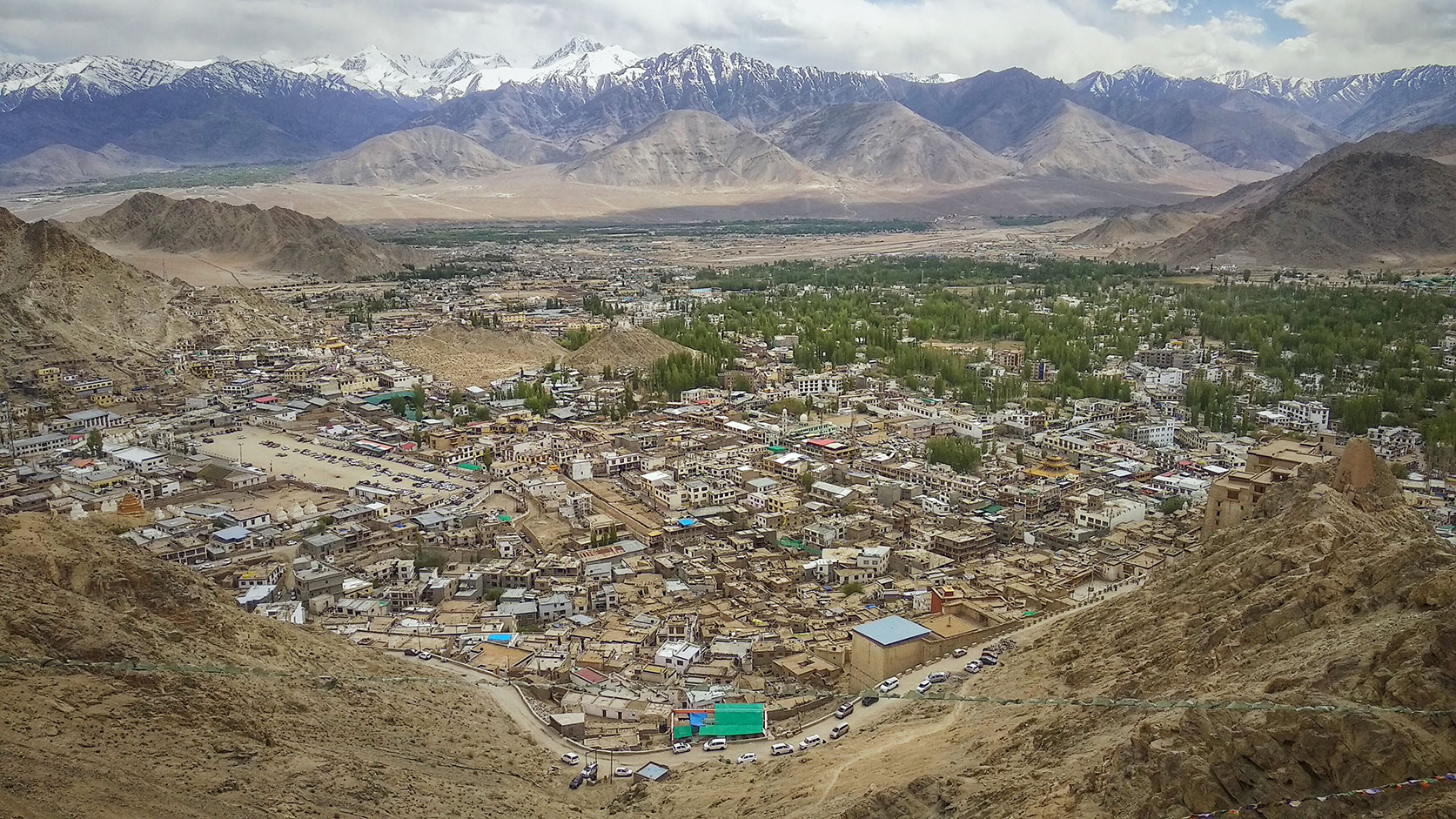
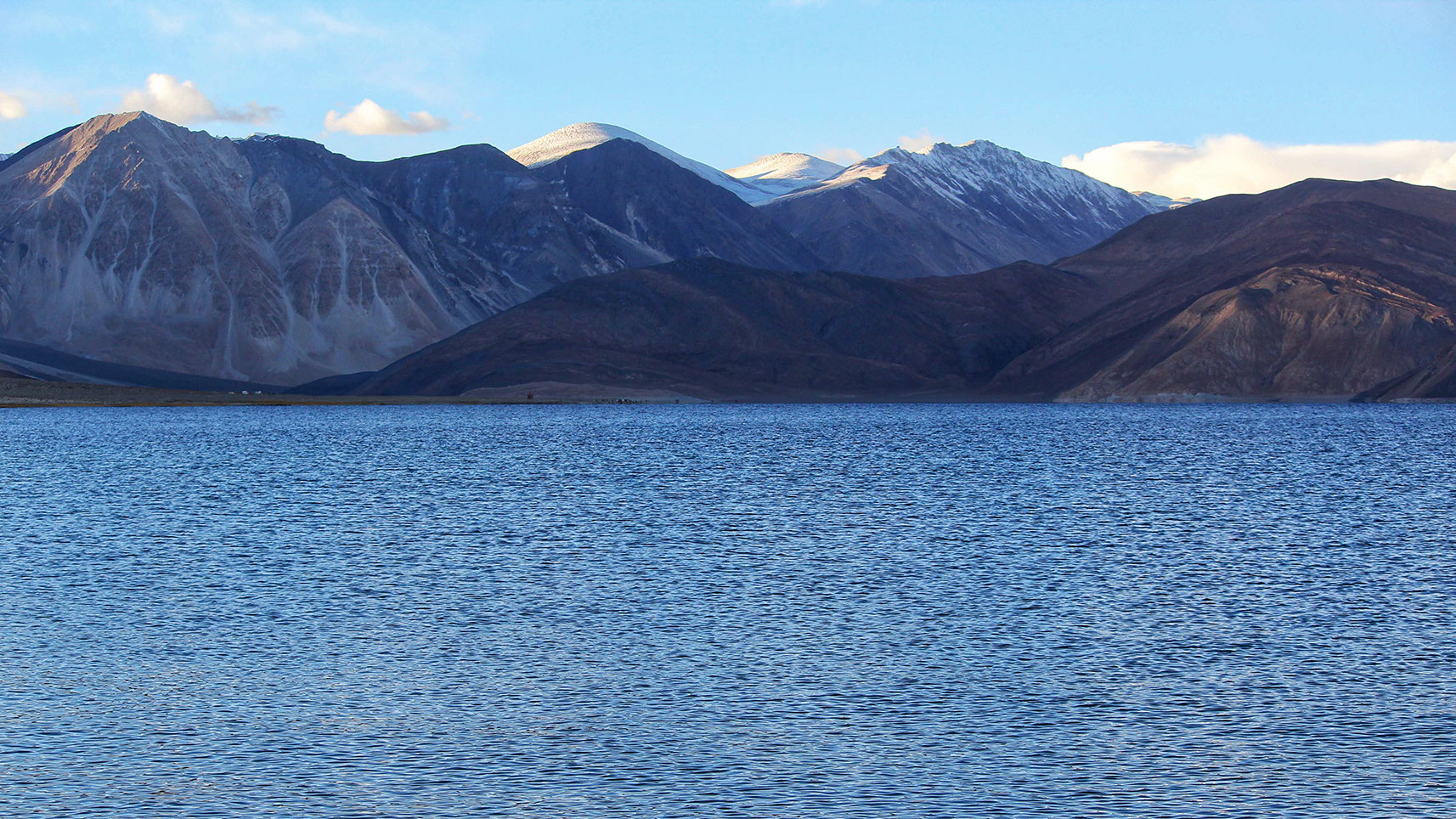
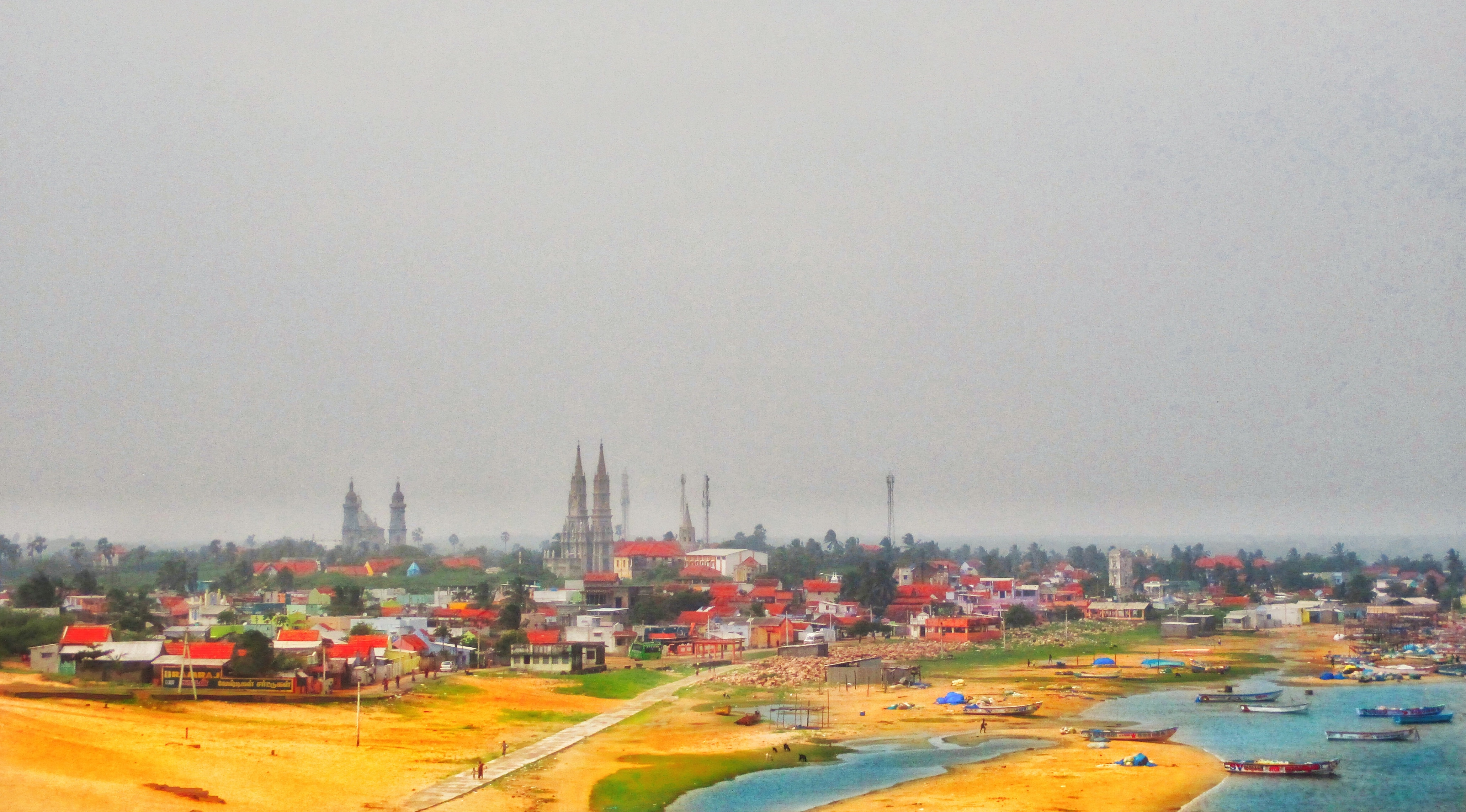
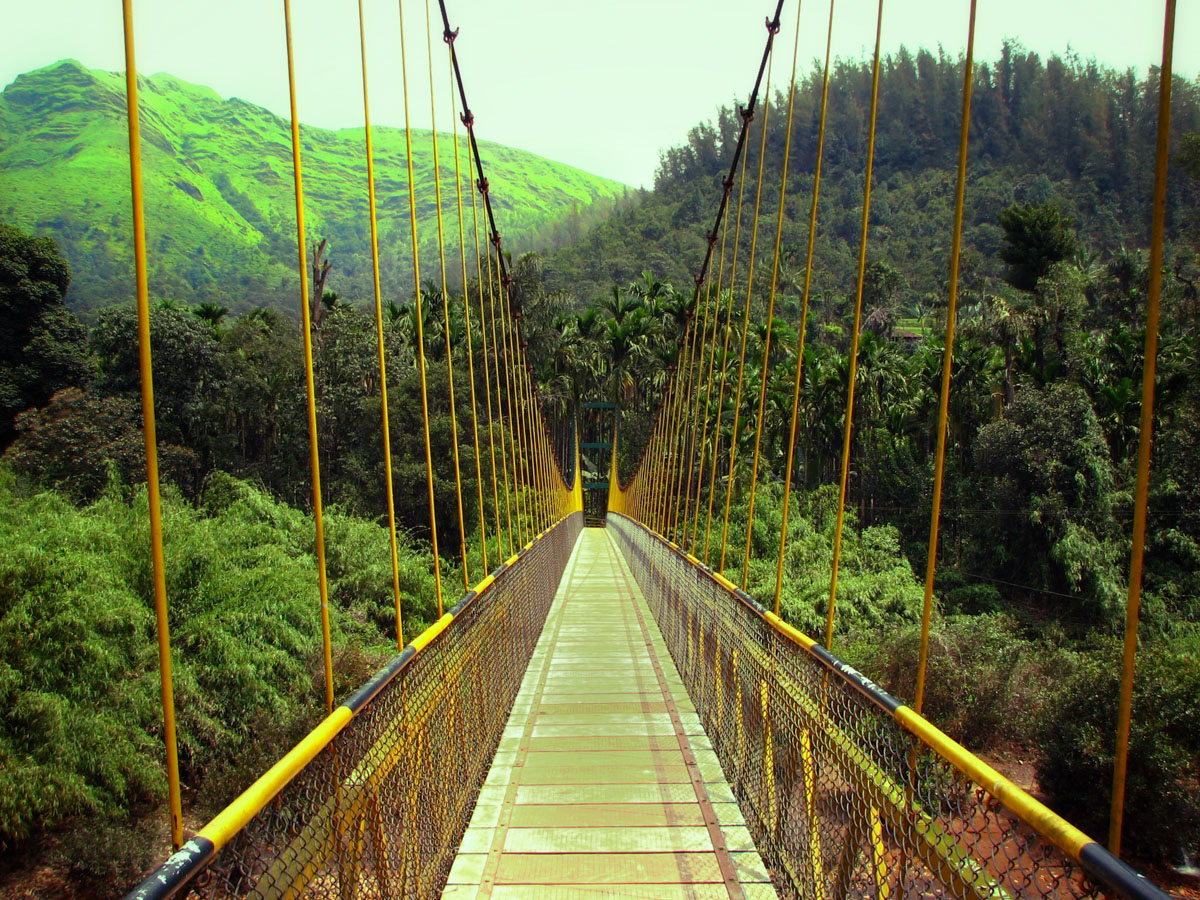
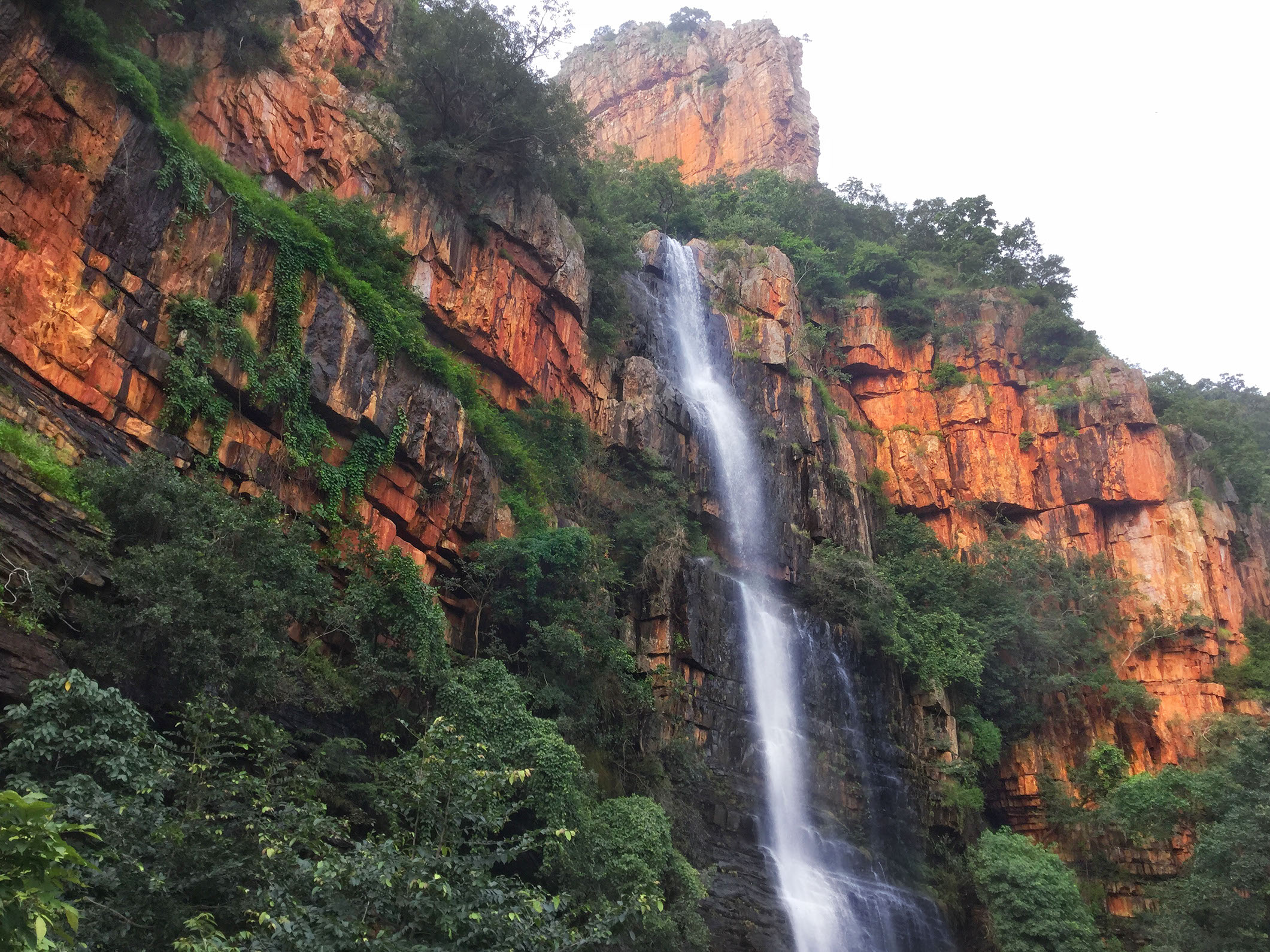
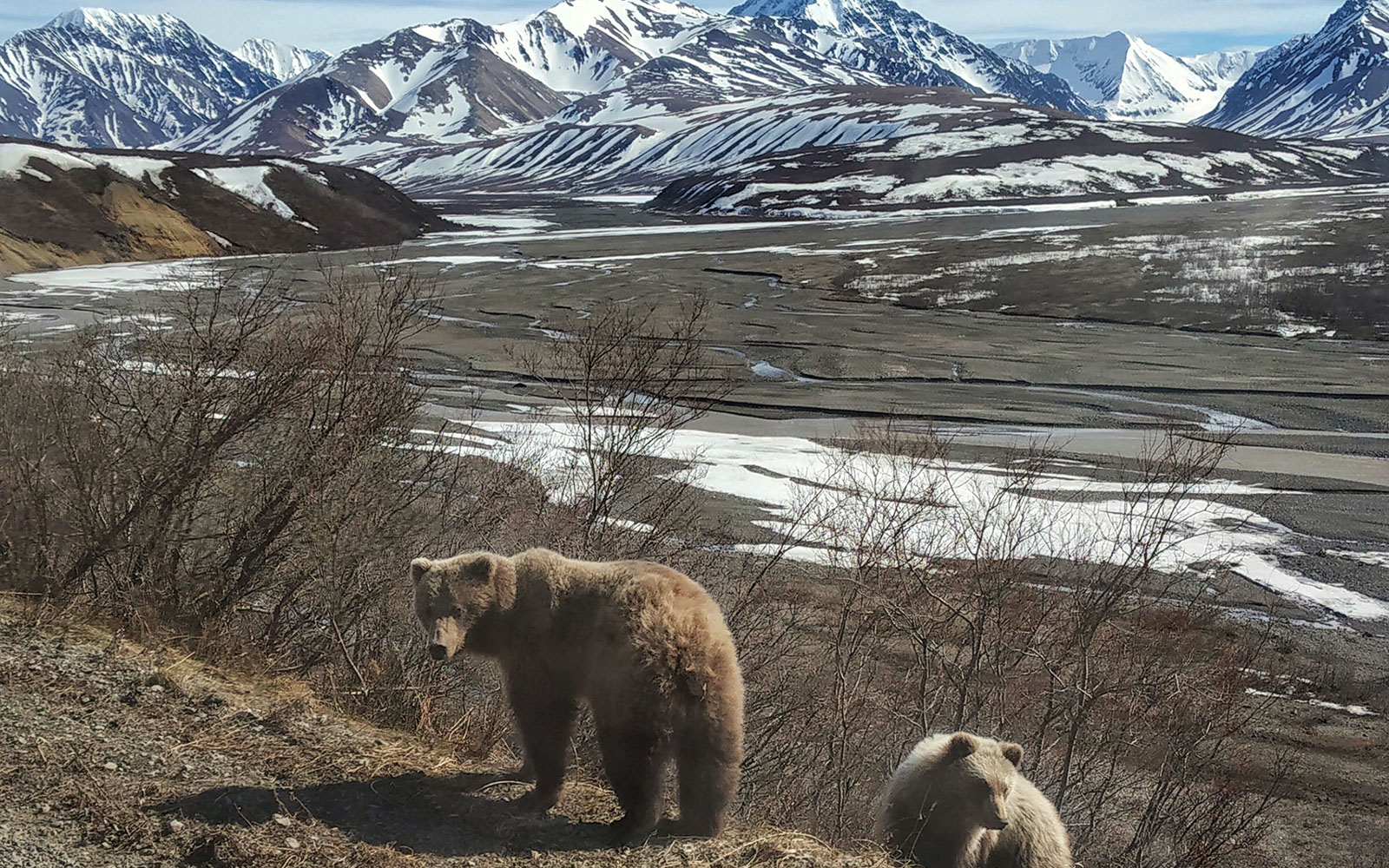
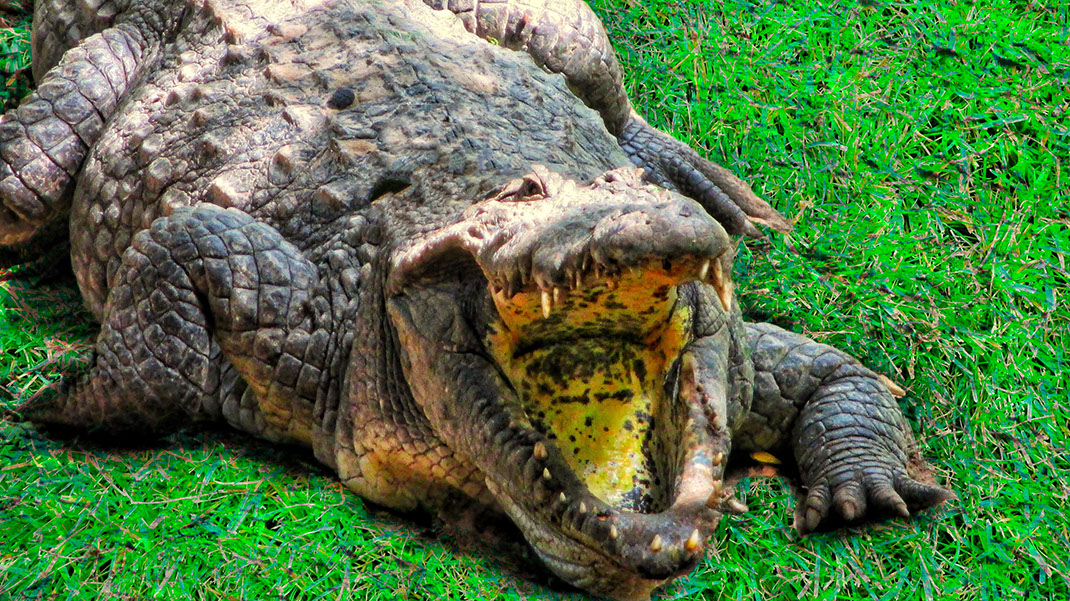

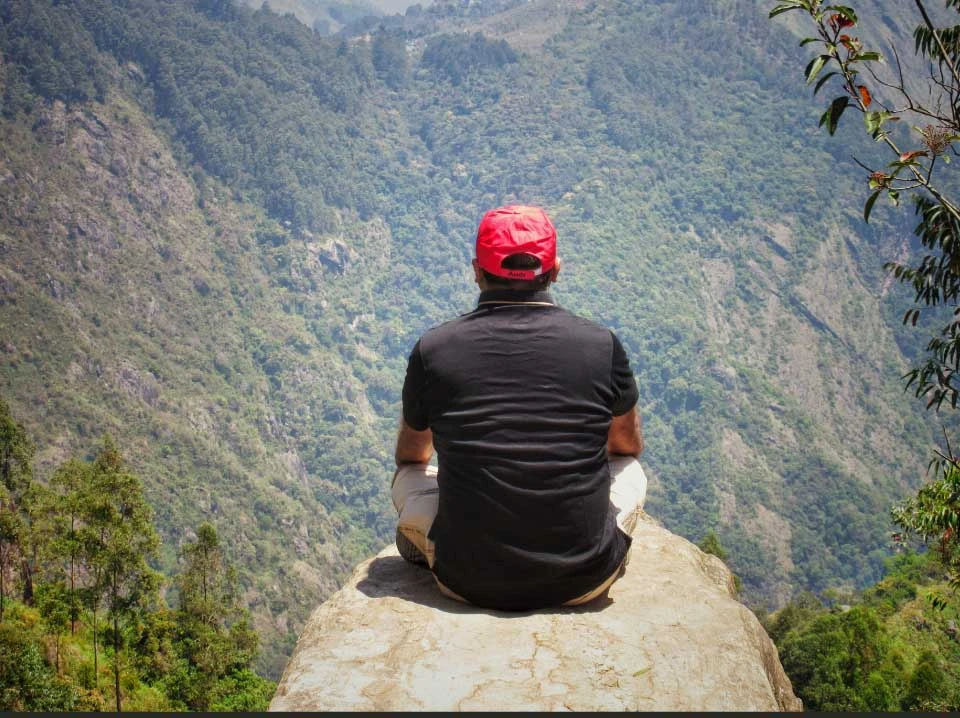
Name
Email
Comment